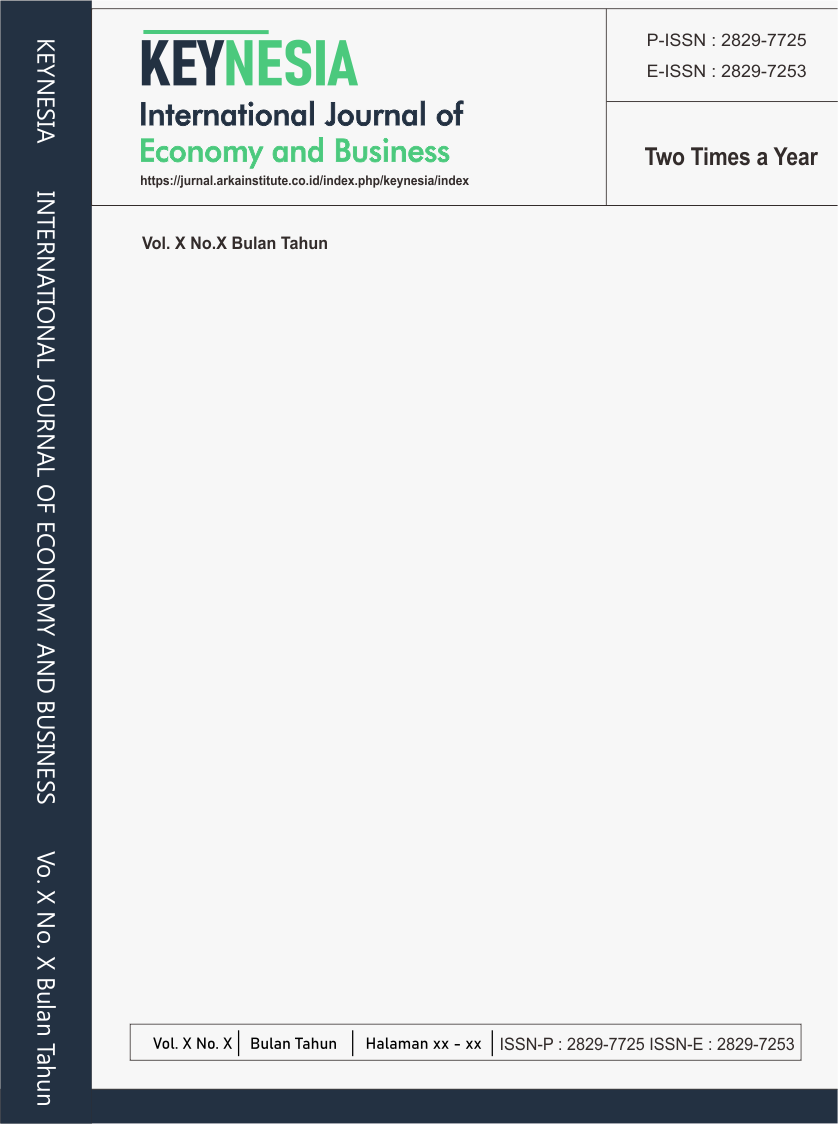Business management strategies in the food industry from a tourism perspective
Main Article Content
Abstract
This study aims to analyze, explore the Business Management Strategy of Culinary Business in Tourism in Cimuja Cimalaka, Sumedang Regency, West Java. This village has great potential for the development of culinary ecotourism. The research conducted is field research using qualitative research. Qualitative research uses observation and interviews in collecting data in the field, the data sources used are primary data and secondary data. The information in this study amounted to 33 people, namely 1 restaurant owner and 32 employees of Saung Teko Restaurant which includes 4 components, namely planning, organizing, actuating and controlling. Planning is done with Service to Customers who come to the Restaurant and serving food according to orders so as not to be excessive so that quality is maintained. Second, Organizing here is in the form of Employees providing services that have been received will be given guidance before working, such as being guided on how to serve well and serving consumer food will maintain its quality. Third, Actuating here is guiding each employee in carrying out each of their duties, starting from working on time. Fourth, Controlling is in the form of directly supervising employees and reprimanding them directly if there is a mistake made by employees. Business management strategies in accordance with tourism principles and effective marketing strategies are the key to successful tourism development.
Article Details
Section

This work is licensed under a Creative Commons Attribution-NonCommercial 4.0 International License.
References
Byrnes, W. J. (2022). Management and the Arts. Routledge.
Diantari, G. A. K. P., Sihombing, I. H. H., & Kalpikawati, I. A. (2024). The Influence of Leadership Style and Motivation on Employee Performance at Four Points By Sheraton Bali, Kuta. Journal of Tourism and Economic, 7(1), 65–78. https://doi.org/10.36594/jtec/g19kty42
Fayol, H. (2010). Manajemen Public Relations. PT Elex Media.
Hapsari, P., & Baiquni, M. (2022). Culinary Business Resilience During the Covid-19 Pandemic: A Case Study from Sanur Bali. Jurnal Gastronomi Indonesia, 10(1), 37–50. https://doi.org/10.52352/jgi.v10i1.772
Indra, F. (2021). Development of Culinary Tourism Using Community Based Tourism Perspective in Pangkal Pinang, Bangka Belitung. Journal of Industrial Engineering & Management Research, 2(5), 228–233. https://doi.org/10.7777/jiemar.v2i5.223
Khoiriani, A. (2021). The influence of motivation and work ability on job satisfaction and performance of restaurant employees in the city of tourism in Yogyakarta, Indonesia. International Journal Administration, Business & Organization, 2(1), 31–43. https://doi.org/10.61242/ijabo.21.158
Makmur, N. L. (2022). Manajemen Pembelajaran Tadabbur Al-Qur’an Di Kuttab Al-Fatih Cabang Beji, Depok, Jawa Barat. Institut PTIQ Jakarta.
Maulida, U. (2022). Pengembangan Modul Ajar Berbasis Kurikulum Merdeka. Tarbawi, 5(2), 130–138.
Moleong, L. J. (2018). Metode penelitian kualitatif. PT. Remaja Rosdakarya.
Mulyantini, S., Surbakti, L. P., Maulana, A., & Wibawaningsih, E. J. (2025). Authentic Culinary Business for Sustainable Tourism: Strategy, Experience, Motivation and Value. Studi Akuntansi, Keuangan, Dan Manajemen, 5(1), 143–159. https://doi.org/10.35912/sakman.v5i1.4279
Nurmilah, R., Ade Sudarma, & Alhidayatullah, A. (2022). Culinary Tourism Development Strategy In Sukabumi. International Journal of Entrepreneurship and Business Management, 1(2), 105–115. https://doi.org/10.54099/ijebm.v1i2.351
Setijadi, V., K, T. A., & Widodo, T. (2025). Exploring the Impact of Transformational Leadership, Training, and Employee Engagement on Restaurant Employee Performance. Journal of Educational Management Research, 4(5), 1800–1809. https://doi.org/10.61987/jemr.v4i5.1179
Situmorang, M. S., & Suryana, M. (2023). The Characteristics Of Tourists Doing Culinary Tour: A Case Study Of Lengkong Street Food Bandung. Journal of Tourism Sustainability, 3(2), 89–93. https://doi.org/10.35313/jtospolban.v3i2.81
Sugiyono. (2019). Metode Penelitian Kuantitatif, Kualitatif, dan R&D. Alfabeta.
Sukartini, N. W., Kanca, I. N., Budiarta, I. P., & Sumawidari, I. A. K. (2024). The role of ambiance and service in culinary tourism: A case study at D’Warung. Journal of Commerce, Management, and Tourism Studies, 3(3), 143–160. https://doi.org/10.58881/jcmts.v3i3.218
Sulaiman, A. I., Pangestuti, S., Sugito, T., & Sabiq, A. (2022). Community Empowerment in Culinary Tourism as Sustainable Rural Development. Sustainable Development Research, 4(1), p1. https://doi.org/10.30560/sdr.v4n1p1
Tanzeh, A. (2009). Pengantar Metode Penelitian. Yogyakarta: teras.
Terry, G. R. (2019). Prinsip-prinsip Manajemen (Revisi). Bumi Aksara.
Wardoyo, M., & Latif, A. N. K. (2018). The Improvement of Creative Industries-Culinary SMEs in The Tourist Destinations of The Greater Bandung Region. ASEAN Journal on Hospitality and Tourism, 16(1), 26. https://doi.org/10.5614/ajht.2018.16.1.3
Yulius, K. G., Franky Nilson Sudirman, & Theovanus. (2024). Explaining Revisit Intention in Culinary Tourism: Case Study of Pekalongan, City of Batik. EDUTOURISM Journal Of Tourism Research, 6(02), 58–73. https://doi.org/10.53050/ejtr.v6i02.1228
Zaroni, A. N. (2007). Bisnis dalam Perspektif Islam (Telaah aspek keagamaan dalam kehidupan ekonomi). Mazahib, 4(2), 172–184. https://doi.org/10.21093/mj.v4i2.507

